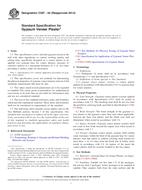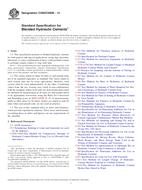Wir benötigen Ihre Einwilligung zur Verwendung der einzelnen Daten, damit Sie unter anderem Informationen zu Ihren Interessen einsehen können. Klicken Sie auf "OK", um Ihre Zustimmung zu erteilen.
ASTM C1709-11
Standard Guide for Evaluation of Alternative Supplementary Cementitious Materials (ASCM) for Use in Concrete
Automatische name übersetzung:
Standard-Handbuch für die Bewertung von Ersatz- und Ergänzungszementgebundene Baustoffe (ASCM) im Beton
NORM herausgegeben am 1.8.2011
Informationen über die Norm:
Bezeichnung normen: ASTM C1709-11
Anmerkung: UNGÜLTIG
Ausgabedatum normen: 1.8.2011
SKU: NS-12268
Zahl der Seiten: 4
Gewicht ca.: 12 g (0.03 Pfund)
Land: Amerikanische technische Norm
Kategorie: Technische Normen ASTM
Kategorie - ähnliche Normen:
Die Annotation des Normtextes ASTM C1709-11 :
Keywords:
alternative supplementary cementitious materials, ASCM, chemical admixtures, concrete, fly ash, pozzolans, SCM, silica fume, slag cement, supplementary cementitious material, ICS Number Code 91.100.10 (Cement. Gypsum. Lime. Mortar)
Ergänzende Informationen
| Significance and Use | ||||||||||||||||||||||||||||||||||||||||||||||||||||||||||||||||||||||||
|
Common types of SCM include fly ash, slag cement, calcined clays, and silica fume. The introduction and widespread use of fly ash, slag cement, calcined clay, and silica fume have been characterized and supported by significant research and development programs, preconstruction testing, field testing and long term performance monitoring. As the technical and economic benefits of SCM have been recognized, and as sustainability and environmental awareness resulted in the need to develop new materials and new ways to use materials not previously utilized, new sources of potential SCM are being proposed for use in concrete as ASCM. If an ASCM does not yet have a significant record of performance in concrete, a comprehensive evaluation based on this Guide should be undertaken, and it should be recognized that this ASCM might be introduced for a specific project or into a limited marketplace to initially demonstrate its performance. The user should bear in mind the intended end use of the ASCM and use appropriate test methods to establish its suitability. An ASCM that demonstrates good performance through a comprehensive evaluation as outlined in this guide could then be considered to have access to broader markets and could be considered for inclusion in an ASTM standard for SCM. For this reason, the test program to demonstrate acceptable performance should include concrete mixtures with a range of characteristics specific to the ASCM’s intended use. In the absence of long-term durability or acceptable field performance, prospective users are advised to apply appropriate risk management and engineering practice in the use of an ASCM. |
||||||||||||||||||||||||||||||||||||||||||||||||||||||||||||||||||||||||
| 1. Scope | ||||||||||||||||||||||||||||||||||||||||||||||||||||||||||||||||||||||||
|
1.1 This Guide is intended to provide a technical approach to the evaluation of alternative supplementary cementitious materials such as pozzolans and hydraulic materials that fall outside the scope of Specifications C618, C989, and C1240. This Guide provides the initial steps for a comprehensive evaluation of an ASCM that provides due diligence for its specific intended uses in concrete; however, it does not evaluate conformance to all possible performance criteria for all types of concrete mixtures. 1.2 The values stated in SI units are to be regarded as standard. No other units of measurement are included in this standard. 1.3 Performing the tests or meeting the test limits in this guide should not imply that the material tested meets the requirements of Specifications C618, C989, and C1240. These materials should not be represented as such and each specific source is to be evaluated separately. 1.4 This guide does not purport to address all environmental and safety concerns, if any, associated with its use. It is the responsibility of the user of this guide to establish the appropriate environmental, health, and safety issues, and identify appropriate risk management procedures. |
||||||||||||||||||||||||||||||||||||||||||||||||||||||||||||||||||||||||
| 2. Referenced Documents | ||||||||||||||||||||||||||||||||||||||||||||||||||||||||||||||||||||||||
|
Ähnliche Normen:
Historisch
1.8.2012
Historisch
1.1.2013
Historisch
1.8.2012
Historisch
1.8.2012
Historisch
1.4.2014
Historisch
1.5.2014
Empfehlungen:
Aktualisierung der technischen Normen
Wollen Sie sich sicher sein, dass Sie nur die gültigen technischen Normen verwenden?
Wir bieten Ihnen eine Lösung, die Ihnen eine Monatsübersicht über die Aktualität der von Ihnen angewandten Normen sicher stellt.
Brauchen Sie mehr Informationen? Sehen Sie sich diese Seite an.



 ASTM C531-00(2012)..
ASTM C531-00(2012).. ASTM C563-13
ASTM C563-13 ASTM C579-01(2012)..
ASTM C579-01(2012).. ASTM C580-02(2012)..
ASTM C580-02(2012).. ASTM C587-04(2014)..
ASTM C587-04(2014).. ASTM C595/C595M-14..
ASTM C595/C595M-14..
 Cookies
Cookies
